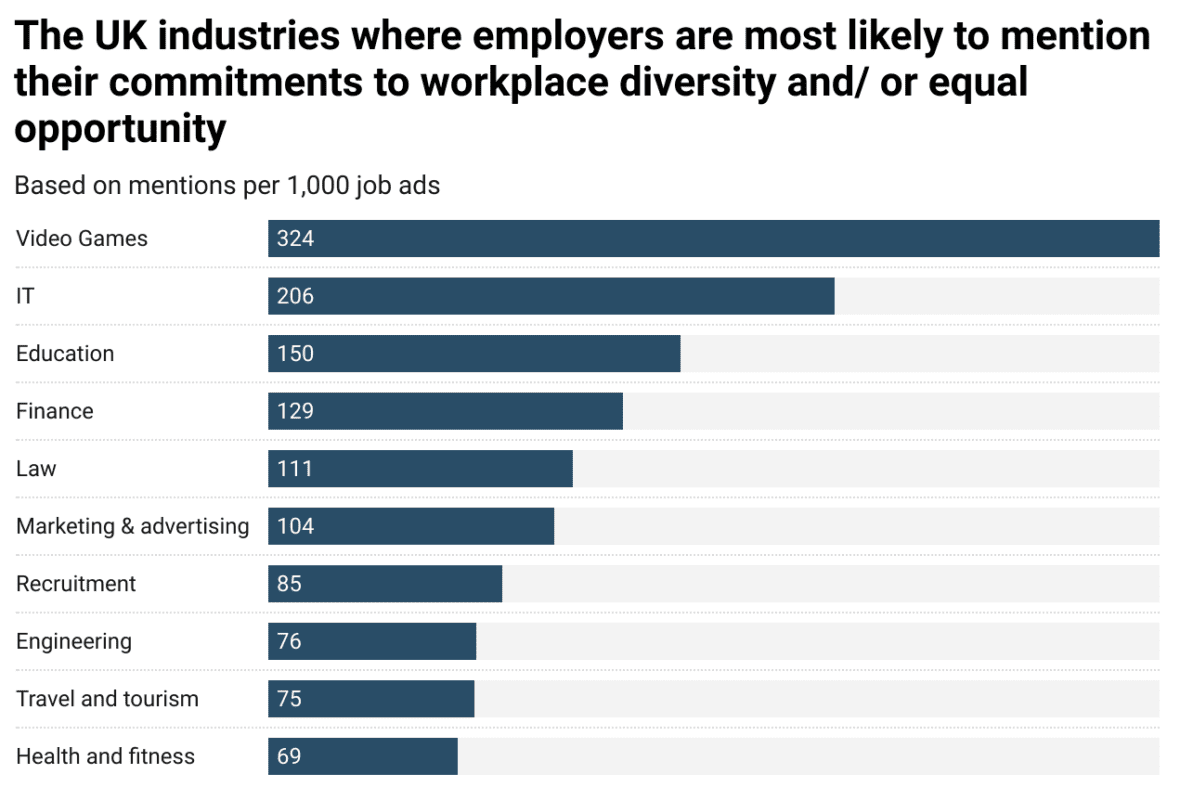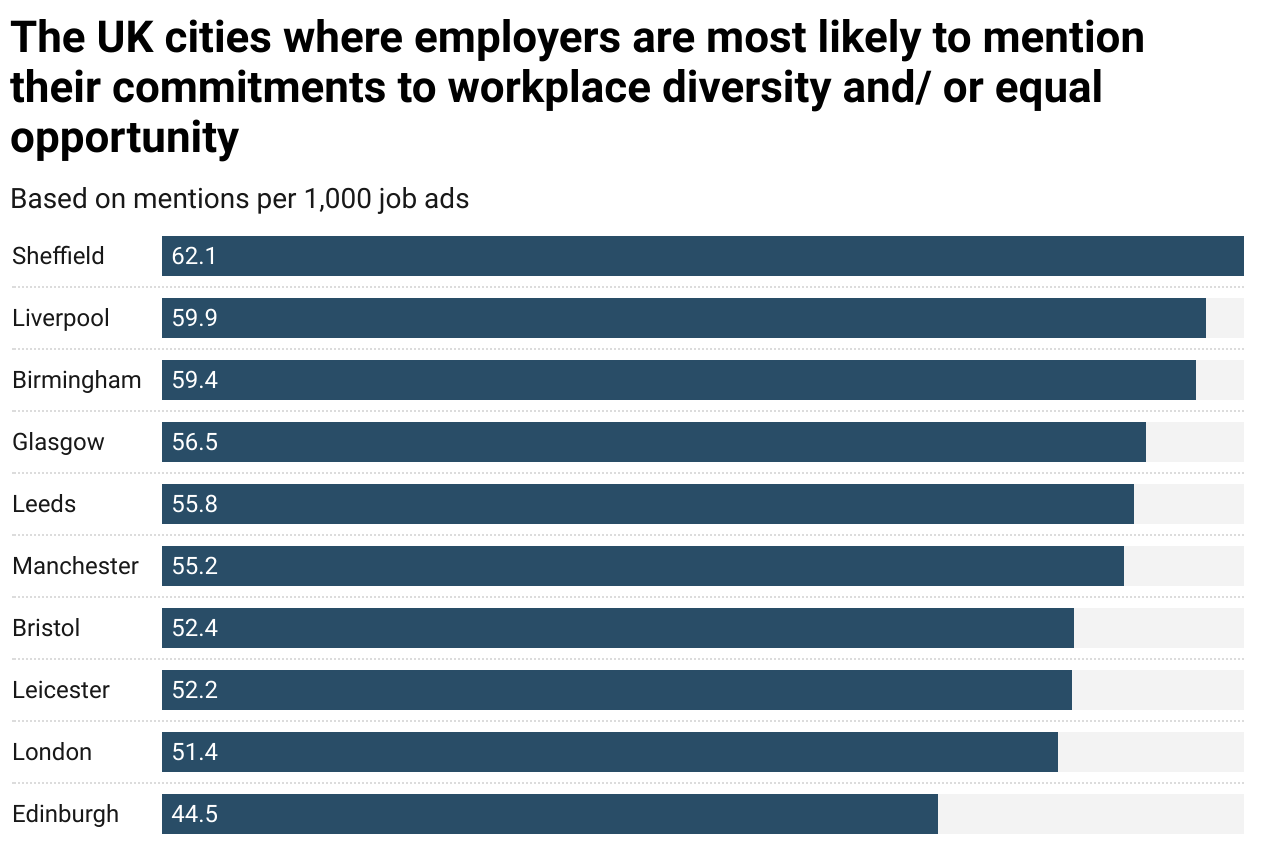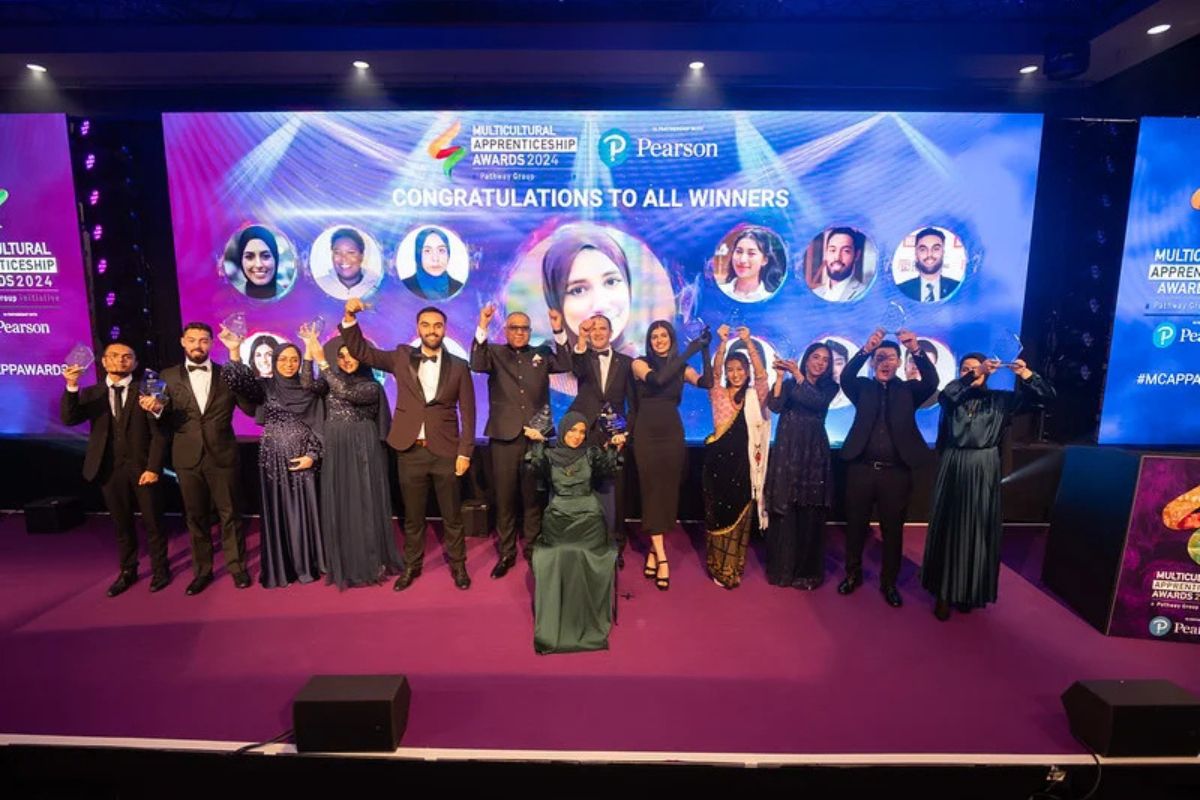Are companies “blah, blah, blah” in terms of inclusivity?

Swedish job search engine, Jobbland.se analysed how common it is for different private sectors and jobs within different locations, to explicitly state that they are equal opportunity employers and/ or committed to diversity in their workplace on an employee level. More than 6.1 million job ads were taken into consideration.
• Which UK industry is most committed to equality and diversity
• Which UK city is most committed to equality and diversity
• 7 tips of how to write a more inclusive job ad
How committed are companies to inclusivity within the job market?
“Real” unemployment affects 32% of the global workforce — which accounts for almost 1.7 billion people worldwide that are currently “unemployed”, according to a 2019 Gallup study. Clearly there are a lot of people looking for jobs and people of all backgrounds use job search engines to find roles that they may otherwise not be offered — and this is the case especially for those who are newer to the job market and may have not yet built up a professional network.
One way in which we can measure how committed companies are, is by the communication and messaging in a company’s job advertisements.
The UK’s video game’s industry is most committed to equality and diversity
Our analysis of private sector jobs in the UK reveals that the video game’s industry is most likely to advertise for an equal and diverse workplace among its job advertisements.
Compared to the UK’s IT sector, which is the second-most likely industry to publicly commit by this measure, the video game industry is 57% more likely with 324 per 1,000 jobs advertising with these commitments.
Where does the UK’s video game’s industry perform on equality? Is it just “Blah, blah, blah”?
If we measure it by gender representation, where most publicly available data is focused, a 2020 survey by the University of Sheffield found that just 28% of people working in the industry were female, while 2% identify as non-binary, and 70% of respondents were made of of male workers.
In one of the country’s fastest-growing industries, where multi-billion pounds of value is being reported each year, these numbers indicate that there is a lot of work for the UK’s gaming industry still to do on ensuring more diverse workplaces are operating, particularly as it is. Ensuring that job ads are inclusive in this way is a step in the right direction.
Last year Jo Twist, the CEO of games industry body Ukie commented:
“Diversity isn’t a nicety; it’s a necessity if the industry is going to grow, thrive and truly reflect the tens of millions of people who play games every day in this country,” she says. “A diverse industry that draws on myriad cultures, lifestyles and experiences will lead to more creative and inclusive games that capture the imagination of players and drive our sector forward.”
Ukie is committed to sign up developers to use more inclusive hiring practices and is something other industries could learn from as well.
The recruitment industry tackling inequality? Blah, blah, blah…
What is remarkable to point out is that the recruitment industry, which is hopefully educated in the field, lands at position 7 (8.5%). As HR teams has a wider range of analytical tools and data, they often know that greater diversity among the workforce adds value.
XpertHR conducted a survey in which “95% of organisations said they are taking action to improve D&I when attracting and selecting potential employees. But just 55% rated their recruitment and selection practices as “effective” or “very effective” in making a positive contribution to their firm’s D&I strategy.”. The report said this highlights the need to develop and implement more effective measures to create more inclusive recruitment practices.
Jo Major, the founder of Diversity in Recruitment states the following:
“There is a will to do something, but I think recruitment businesses get distracted by the pressure to launch initiatives and long-term strategies without building the foundations. I think that’s why things don’t stick, and we end up looking a bit performative.”
Geographically, it is Sheffield’s employers that are most committed to equality and diversity compared to any other UK city
The Yorkshire city of Sheffield boasts 62.1 job ads in every 1,000 explicitly stating its commitments to diversity or as an equal opportunity employer. While this is still quite a low proportion, at less than 10%, it is still ahead of larger UK cities such as London, Manchester and Birmingham.

Historically known for its steel manufacturing trade, as recently as 2008 it was voted in the UK’s top cities for businesses, and the modern version of Sheffield has been focussed on developing its tech and sport sectors. It also presents a popular and more affordable location for younger people in the job market to access wide employment opportunities.
Overview gender equality
Iceland is the most gender-equal country in the world for the 12th time, followed by Finland, Norway, New Zealand, and Sweden. The UK was ranked at No. 23, followed by Canada at No. 24 and the US moved up 23 spots to No. 30 according to the WEF global gender gap report.
The gap between female and male employment rates in the UK is the lowest since it was first recorded in 1971, meaning the UK workforce is more gender-diverse than ever. However, the mission continues. Although female salaries continue to rise in the UK at a faster rate than men’s, the income gap still exists.
Here are 7 tips to writing a more inclusive job ad:
- Make it clear that you welcome/ are committed to diversity and inclusion
State that you are an inclusive company to make your job appeal more widely to potential suitable applicants. Reveal how many nationalities or languages or countries are represented by your team as evidence.
- Avoid too much gendered language
Avoid excessive use of gendered coded language by scanning your ad through useful tools such as this language gender decoder to see how your job ad stacks up. Remember to use non-gendered pronouns too, such as ‘their’ over ‘her’s’ or ‘his’ and ‘they’ or ‘them’ over ‘him’ or ‘her’.
- Avoid ageist language
Phrases such as ‘recent graduate’, ‘energetic’, and ‘digital native’ instantly suggest that a person from an older generation would not be able to perform the same role as someone younger.
- Avoid phrases that indicate racial bias
Wording such as ‘strong or native English skills’ as opposed to ‘proficient in English’ can suggest to a non-native speaker that the role doesn’t apply to them.
- Make your job ad jargon free
Jargon is a necessary part of language within certain professional circles, but to many job applicants — particularly at a junior level — it can be off-putting and potentially see them not apply to the role because they do not understand one or two specialist phrases.
- Is your job ad easy to decode?
Using highly complex language that is abstract or embedded within dense paragraphs can also turn people away, because the complexity of your language is failing to describe in simple terms what the role and the company is all about. The British Dyslexia Association also recommends using serif fonts, such as arial, comic sanda, open sans, calibri, or tahoma, as these are easier to read.
- Shout about your inclusive benefits
Work perks and policies, such as flexible hours, working-from-home, train ticket loans, and company vehicles can all contribute to attracting a wider pool of applicants.











Responses